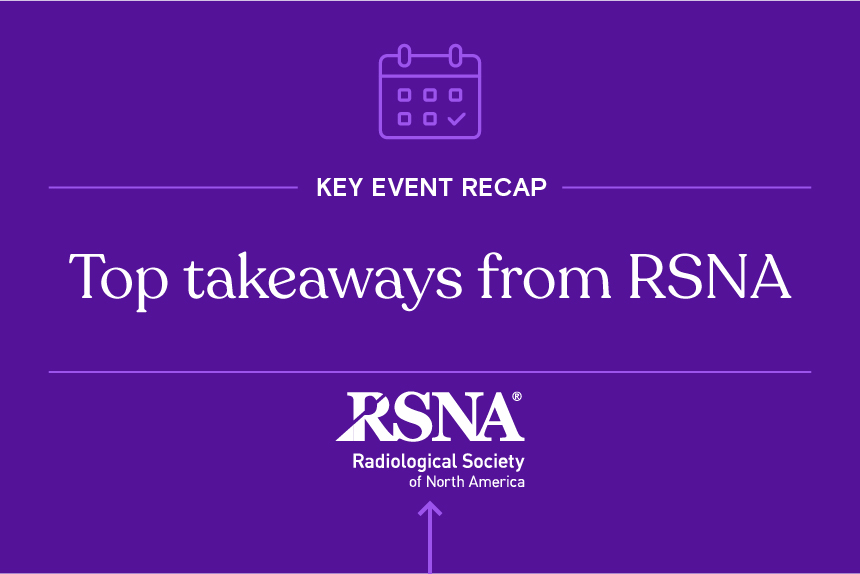The Radiological Society of North America (RSNA) 2024 annual meeting in Chicago once again brought together thousands of radiologists, imaging scientists, healthcare executives, and industry experts and visionaries.
This year’s event was centered around the theme of building collaborative, intelligent connections between people and technology to elevate radiology and redefine care delivery.
From thought-provoking discussions to previews of groundbreaking technologies, we were more than excited to attend RSNA 2024, connect with customers old and new, and witness firsthand what’s coming on the horizon for radiology and medical imaging.
Let’s get into the recap of some of the most exciting highlights from this year’s conference!
AI’s popularity is exploding, but are we using it ethically?
To no one’s surprise, artificial intelligence was a part of every conversation at RSNA this year, and sparked more than 150 presentations, workshops, and learning sessions around use cases and benefits of the technology, as well as how to maximize your ROI with AI.
In the medical imaging sector, AI is helping physicians sift through large volumes of scans and diagnostic insights faster and with greater accuracy than ever before. The technology is also building bridges between radiologists and oncologists by reducing repetitive data-entry tasks and automatically appending electronic health records (EHRs) with imaging and diagnostic data. These benefits (and many others) lead to earlier disease diagnosis and prevention, and potentially better patient outcomes.
Beyond learning how providers and imaging experts can make the most out of AI at RSNA, there was also a great deal of concern surrounding the incorporation and use of AI in a way that is secure, ethical, and free of bias.
In the session, “Emerging topics in AI: Trustworthiness, safety, ethics, and bias,” the panelists discussed the critical need for AI to be trustworthy for everyone involved in a patient’s journey. While AI can enhance diagnostic accuracy, streamline workflows, and improve patient outcomes, the implementation of this technology must prioritize trust, safety, and fairness to avoid unintended harm.
To start this, healthcare organizations can consider:
Building trust in AI through education and transparency
Clinicians need to understand the decision-making processes of AI algorithms—clear, understandable rationale can help mitigate provider hesitation and patient skepticism.
Addressing safety concerns
The safety of the patient is paramount, especially when using AI to assist in diagnosing and treating complex conditions. Healthcare organizations need to continuously monitor and validate the functionality and reliability of their AI tools to ensure no errors or malfunctions.
Safeguarding patient privacy
AI may be revolutionizing nearly every facet of the healthcare landscape, but it’s important that we don’t let the pursuit of innovation compromise protected health information (PHI) and patients. As AI models become more sophisticated and more commonplace, healthcare providers must remain vigilant against data breaches and adhere to regulations and laws that are essential to the ethical application of AI.
Combating bias
Alongside privacy, the potential for bias in AI systems is another pressing concern. Healthcare organizations can reduce or eliminate bias in their data by adopting inclusive data practices and regularly auditing their AI for bias.
Challenges remain in the radiology job market
RSNA is also an excellent opportunity for physicians and radiologists to improve their knowledge and skills, practice new techniques, and access the results of new research through continuing education sessions.
Two standout topics this year focused on radiologist workforce trends and strategies to address burnout—issues that are shaping the future of the radiology field.
In the session, “Conquering 2024 radiologist workforce challenges,” panelists brought attendees up-to-speed on the state of the current radiologist job market in the U.S. and discussed strategies to help recruit and retain a talented, diverse workforce.
Radiology, like many other fields in medicine, remains impacted by the ongoing global physician shortage. According to our data on radiologist activity trends, about 5,500 radiologists dropped out of the workforce by Q4 2023, an approximate 11% decrease from Q4 2022.
Healthcare organization leaders and decision makers can address these workforce challenges by:
- Harnessing AI and automation. By automating routine tasks and improving workflow efficiency, AI can help alleviate the workload on radiologists, allowing them to focus on high-value tasks and patient interactions.
- Promoting team-based care. Expanding collaborative care models that integrate radiologists more closely with other medical specialties, such as oncology and cardiology, can distribute responsibilities more effectively and enhance patient care.
- Investing in pipeline programs. Encouraging interest in radiology careers among medical students and early-career physicians remains critical to the health and advancement of radiology.
Burnout among radiologists is another critical issue addressed at RSNA 2024. The high-pressure environment, long hours, and the emotional toll of interpreting life-altering diagnostic results can lead to fatigue, disengagement, and decreased job satisfaction. The session, “Curing burnout: Optimizing radiologist well-being through local and national approaches,” explored how leadership at healthcare organizations can cause or cure radiologist burnout, and how they can implement solutions to address this nationwide issue.
Burnout is impacting providers of all specialties. As we explored at length in our staffing shortage report and on our blog, burnout can lead to depression and increase the likelihood of malpractice or medical error, reducing the quality of patient care or even putting patients in harmful situations.
While there’s no one simple solution to alleviating burnout, leaders at healthcare organizations should consider:
- Integrating wellness programs. Institutions are increasingly adopting programs that emphasize mindfulness, mental health support, and physical well-being to help radiologists manage stress.
- Optimizing workflows. Reducing inefficiencies through better scheduling systems and smarter use of AI tools can help lighten workloads and improve overall job satisfaction.
- Fostering supportive environments. Peer support networks and leadership that prioritizes employee well-being were identified as crucial for creating a healthier workplace culture.
Monocl Conferences
RSNA 2024 was also an excellent opportunity to unveil the latest improvements and enhancements to our Monocl Expert Suite, including the addition of our Monocl Conferences product.
Monocl Conferences is a powerful tool that elevates the way medical affairs and conference teams approach events. It’s designed to help you make the most of your time spent at scientific and medical conferences, reducing the time spent researching and planning so you can optimize your KOL engagement and conference impact.
For major events like RSNA, which feature a massive number of sessions, workshops, presentations, and networking opportunities, it can be easy to feel overwhelmed and question where your team should be to maximize strategic engagement during your limited time. Monocl Conferences empowers your teams with the insights they need to make every minute—and conversation—count.
See what’s coming next in radiology
Exciting times are ahead for the radiology field. Technological advancements like AI are changing the way radiologists work and how healthcare providers and organizations are tackling the ongoing challenges of the industry. The future is a little uncertain, but it is filled with opportunities to grow and create innovative solutions.
To do that, you’ll need the right healthcare commercial intelligence at your side. Definitive Healthcare products like ImagingView offers your organization access to the key metrics—and the executive contacts—that are shaping the medical imaging market across the U.S. You’ll find essential insights on procedure activity, technology implementations, and affiliations, so you can find the imaging centers and specialists most important to you.
Interested? Start a free trial with Definitive Healthcare today to explore our data and grow your business faster.


